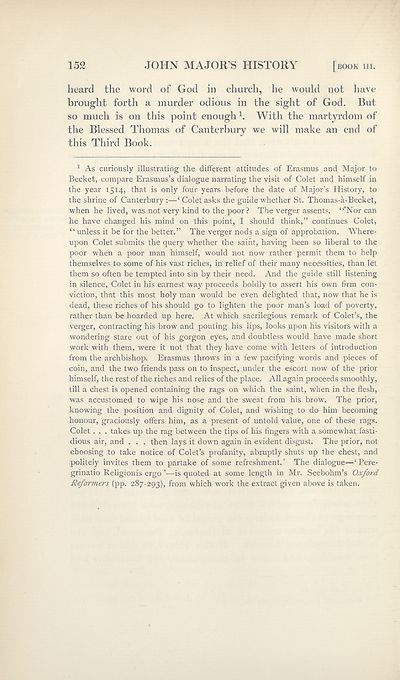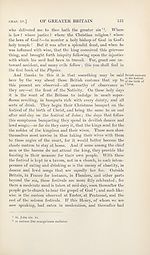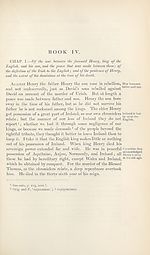Series 1 > History of Greater Britain, as well England as Scotland
(297) Page 152
Download files
Complete book:
Individual page:
Thumbnail gallery: Grid view | List view

152
JOHN MAJOR’S HISTORY
[book hi.
heard the word of God in church, he would not have
brought forth a murder odious in the sight of God. But
so much is on this point enough1. With the martyrdom of
the Blessed Thomas of Canterbury we will make an end of
this Third Book.
1 As curiously illustrating the different attitudes of Erasmus and Major to
Becket, compare Erasmus’s dialogue narrating the visit of Colet and himself in
the year 1514, that is only four years before the date of Major’s History, to
the shrine of Canterbury :—4 Colet asks the guide whether St. Thomas-a-Becket,
when he lived, was not very kind to the poor? The verger assents. “’Nor can
he have changed his mind on this point, I should think,” continues Colet,
“unless it be for the better.” The verger nods a sign of approbation. Where¬
upon Colet submits the query whether the saint, having been so liberal to the
poor when a poor man himself, would not now rather permit them to help
themselves to some of his vast riches, in relief of their many necessities, than let
them so often be tempted into sin by their need. And the guide still listening
in silence, Colet in his earnest way proceeds boldly to assert his own firm con¬
viction, that this most holy man would be even delighted that, now that he is
dead, these riches of his should go to lighten the poor man’s load of poverty,
rather than be hoarded up here. At which sacrilegious remark of Colet’s, the
verger, contracting his brow and pouting his lips, looks upon his visitors with a
wondering stare out of his gorgon eyes, and doubtless would have made short
work with them, were it not that they have come with letters of introduction
from the archbishop. Erasmus throws in a few pacifying words and pieces of
coin, and the two friends pass on to inspect, under the escort now of the prior
himself, the rest of the riches and relics of the place. All again proceeds smoothly,
till a chest is opened containing the rags on which the saint, when in the flesh,
was accustomed to wipe his nose and the sweat from his brow. The prior,
knowing the position and dignity of Colet, and wishing to do him becoming
honour, graciously offers him, as a present of untold value, one of these rags.
Colet . . . takes up the rag between the tips of his fingers with a somewhat fasti¬
dious air, and . . . then lays it down again in evident disgust. The prior, not
choosing to take notice of Colet’s profanity, abruptly shuts up the chest, and
politely invites them to partake of some refreshment.’ The dialogue—‘Pere-
grinatio Religionis ergo ’—is quoted at some length in Mr. Seebohm’s Oxford
Reformers (pp. 287-293), from which work the extract given above is taken.
JOHN MAJOR’S HISTORY
[book hi.
heard the word of God in church, he would not have
brought forth a murder odious in the sight of God. But
so much is on this point enough1. With the martyrdom of
the Blessed Thomas of Canterbury we will make an end of
this Third Book.
1 As curiously illustrating the different attitudes of Erasmus and Major to
Becket, compare Erasmus’s dialogue narrating the visit of Colet and himself in
the year 1514, that is only four years before the date of Major’s History, to
the shrine of Canterbury :—4 Colet asks the guide whether St. Thomas-a-Becket,
when he lived, was not very kind to the poor? The verger assents. “’Nor can
he have changed his mind on this point, I should think,” continues Colet,
“unless it be for the better.” The verger nods a sign of approbation. Where¬
upon Colet submits the query whether the saint, having been so liberal to the
poor when a poor man himself, would not now rather permit them to help
themselves to some of his vast riches, in relief of their many necessities, than let
them so often be tempted into sin by their need. And the guide still listening
in silence, Colet in his earnest way proceeds boldly to assert his own firm con¬
viction, that this most holy man would be even delighted that, now that he is
dead, these riches of his should go to lighten the poor man’s load of poverty,
rather than be hoarded up here. At which sacrilegious remark of Colet’s, the
verger, contracting his brow and pouting his lips, looks upon his visitors with a
wondering stare out of his gorgon eyes, and doubtless would have made short
work with them, were it not that they have come with letters of introduction
from the archbishop. Erasmus throws in a few pacifying words and pieces of
coin, and the two friends pass on to inspect, under the escort now of the prior
himself, the rest of the riches and relics of the place. All again proceeds smoothly,
till a chest is opened containing the rags on which the saint, when in the flesh,
was accustomed to wipe his nose and the sweat from his brow. The prior,
knowing the position and dignity of Colet, and wishing to do him becoming
honour, graciously offers him, as a present of untold value, one of these rags.
Colet . . . takes up the rag between the tips of his fingers with a somewhat fasti¬
dious air, and . . . then lays it down again in evident disgust. The prior, not
choosing to take notice of Colet’s profanity, abruptly shuts up the chest, and
politely invites them to partake of some refreshment.’ The dialogue—‘Pere-
grinatio Religionis ergo ’—is quoted at some length in Mr. Seebohm’s Oxford
Reformers (pp. 287-293), from which work the extract given above is taken.
Set display mode to:
![]() Universal Viewer |
Universal Viewer | ![]() Mirador |
Large image | Transcription
Mirador |
Large image | Transcription
Images and transcriptions on this page, including medium image downloads, may be used under the Creative Commons Attribution 4.0 International Licence unless otherwise stated. ![]()
| Scottish History Society volumes > Series 1 > History of Greater Britain, as well England as Scotland > (297) Page 152 |
|---|
| Permanent URL | https://digital.nls.uk/127735329 |
|---|
| Attribution and copyright: |
|
|---|
| Description | Over 180 volumes, published by the Scottish History Society, containing original sources on Scotland's history and people. With a wide range of subjects, the books collectively cover all periods from the 12th to 20th centuries, and reflect changing trends in Scottish history. Sources are accompanied by scholarly interpretation, references and bibliographies. Volumes are usually published annually, and more digitised volumes will be added as they become available. |
|---|


